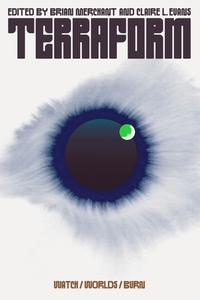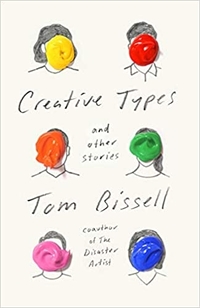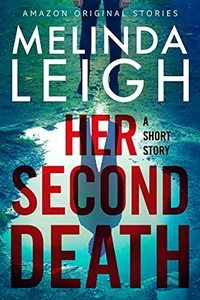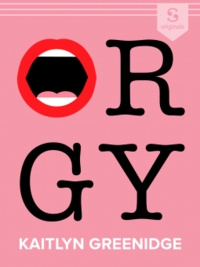Terraform by Brian Merchant and Claire L. Evans (eds.)
 Friday, September 2, 2022 at 10:40AM
Friday, September 2, 2022 at 10:40AM 
Published by Farrar, Straus and Giroux /MCD x FSG Originals on August 16, 2022
Terraform is an anthology of science fiction stories that were published digitally on VICE’s “digital speculative story destination” of the same name. Corey Doctorow’s introduction to this collection suggests the value of Luddites, defined not as people who oppose technology but as people who oppose the use of technology to benefit owners at the expense of workers. He embarks on a riff about the gutting of antitrust law before he talks about the need for science fiction that imagines alternative technologies, or uses of technology, in ways that benefit people rather than capital.
In a preface, the editors of this anthology are less ambitious. Boiled down, they explain that Terraform publishes stories by new or unheralded sf writers. An unacknowledged risk of focusing on new writers is that prose will unpolished and ideas will be insufficiently developed. Many stories in the volume suffer from those flaws. When an anthology collects a large number of sf stories from newer writers, the quality will inevitably be uneven.
The stories in the first section focus on technology. An online service streams cute animals without disclosing the ways in which the animals (and the people who work for the service) are abused. Archived records of personal activity are deleted by drastic means. A kid explains to her school why she’s opting out of technology that enhances her sensory experiences. Letters smuggled across the border are the only way for deported migrants to keep in touch with relatives in the US because they are not allowed to communicate over wires or wirelessly. A male prostitute whose body is occupied by other men is asked to allow an artificial intelligence to use his body. A ghost who looks like Ernest Borgnine becomes a guest on Jimmy Kimmel’s show in an effort to obtain justice.
The best story in the first section is “The End of Big Data” by James Bridle. A data crash made all private information available for the taking. Governments responded by criminalizing the electronic storage of data. The UN monitors compliance with satellites that seek out evidence of server farms. The UN’s response to its discovery of illegal data storage is drastic.
The stories in the second section are set in the future. An archivist talks about maintaining biobots in the form of moths. A girl’s life is influenced by a talking head she finds floating down a stream after it was separated from its organically grown body. An artificial womb permits external gestation. Sentient drones enforcing agricultural rules that regulate all of society are offered a safe haven in a cooperative community that gives freedom to humans and drones. A dog that receives an intelligence enhancement yearns for a simpler time. The failure of technology portends a devolution of humanity that inspires philosophers to ask whether humanity really matters.
I have a couple of favorite stories in this section. Robin Sloan’s “The Counselor” addresses society’s response to the public expense of caring for the aging as medicine finds new ways to prolong life. The solution: assign an AI counselor whose job is to encourage older people to end their lives. In Lincoln Michel’s “Duchy of the Toe Adam,” all that is left of a religious colony has devolved into worshippers of the toe who are at war with worshippers of the nose (having defeated worshippers of other sacrilegious body parts).
The third section is devoted to dystopian stories. The rebooted dead are plotting a revolution. Revolutionary elephants have taken over Phuket. Space alien refugees are treated just as poorly as refugees from Earth’s nations. A school transport drone mistakenly returns a refugee to her original home in Mexico. A band member wakes up on the tour bus and discovers that everyone on the bus, and perhaps everyone in Texas or the world, has disappeared. Zombie capitalists. All green card holders are deported. A corporation has been gaming carbon credits by storing all its carbon emissions.
The first of my three favorites in this section is Russell Nichols’ “U Won’t Remember Dying.” A kid who was shot by the police texts his future self as he waits for his consciousness to be transferred to a cloned body. The story is a powerful and timely. The second is Bruce Sterling’s “The Brain Dump.” Oppressed Ukrainian hackers suddenly become moguls in Sterling’s 2014 commentary on the difficulty of maintaining anarchy in a pure form. My favorite story in the collection is Jeff VanderMeer’s “Always Home.” The New People were originally machines. Now they are everything. They oversee the planet’s restoration to a natural state. One of the few remaining Old People wonders why the New People brought back nature but not humans. A battle for the future ensues.
Sterling and VanderMeer are the only writers in this anthology whose work I am certain I’ve read, although I recognize the names of a few other contributors: Tobias Buckell, Meg Elison, Sam J. Miller, Tochi Onyebuchi, E. Lily Yu. Doctorow’s introduction is interesting but, sadly, he did not contribute a story to the collection. Too many of these stories are insubstantial, more ideas for stories than stories given flesh, but more than half are entertaining.
RECOMMENDED



